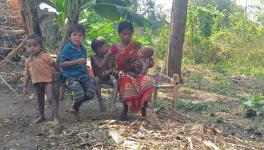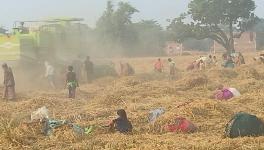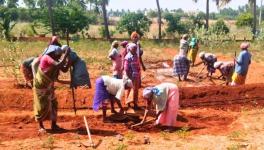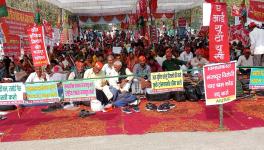COVID-19 in Rural India –VI: No Jobs or Payments as Powerlooms Fall Silent in Tiruppur
Image Representational use only. image Courtesy: New Indian Express
This is the sixth report in a series that provides glimpses into the impact of COVID-19-related policies on life in rural India. The series, commissioned by the Society for Social and Economic Research, comprises reports by various scholars who have been conducting village studies in different parts of India. The reports have been prepared on the basis of telephonic interviews with key informants in their study villages. This report describes the situation in a village in Tamil Nadu’s Tiruppur district, the hub of India’s knitted garment industry, where economic activity has come to a halt after the 21-day lockdown was announced on March 24.
Power loom units have fallen silent in Mangalapuram*, in Tamil Nadu’s Tiruppur City, the headquarters of the district that is known as the hub of India’s knitted garments, catering toboth the domestic and export markets. The village has 20 power loom units, six Sulzer loom units and one open-end spinning mill.
Powerlooms, one of the major economic activities of the village inhabitants, halted operations on March 24 (Tuesday night), leaving workers without jobs and payment.
Vegetable cultivation is the other major economic activity. Farmers in Mangalapuram cultivate a variety of crops, including shallot, tomato, broad bean, ridge gourd, bottle gourd, bitter gourd, banana, coconut and curry leaves. Wells and bore-wells are the dominant source of irrigation, while drip irrigation is the most prevalent method of irrigation.
Telephonic interviews were conducted with several respondents residing in the village between April 1 and 3, 2020, who are involved in the following occupations: power loom worker, tailor, driver, power loom owner, fitter (power loom), agricultural worker, farmer, and migrant marginal tenant farmer.
AM: Power loom Worker
AM is a worker at one of the power looms in Mangalapuram. He is married, and has a three-year-old son. Like many of his fellow workers, AM had taken Rs 1 lakh as advance from the loom’s owner as an interest-free debt. Workers cannot leave their jobs before they have repaid the money, and this practice helps the loom owner enforce discipline and maintain a stable labour force.
AM was last at his job on March 23, and received about Rs 2,000 for his last week of work (the wages are piece-rated at about Rs 1.60 per metre and paid weekly). He also received Rs 500 from the owner on account of the lockdown. (AM said this money was not a payment for the days that he was unable to work on account of the lockdown but merely an advance to be adjusted against his future earnings.)
AM’s wife occasionally works under the rural job guarantee scheme, MGNREGS, which has has not resumed since it was halted on March 21, 2020, on account of the government’s announcement of a ‘Janata Curfew’ to be observed on March 22. She is yet to receive her wages for the 25 days or so she worked prior to March 21.
The local anganwadi was supposed to provide either cooked meals or the equivalent amount of grains to children for as long as it remains closed. AM reported having received food only for three days after the anganwadi closed. The impact of this on the food security of children in Mangalapuram, therefore, is a source of worry. At the time of our conversation, AM and his wife were awaiting free rations under the public distribution system, which were expected to be distributed on April 2. The government had also announced a cash payment of Rs 1,000 per ration card. (We later confirmed with them that they had received this).
However, AM does not have the means to pay the EMI (equated monthly instalments) he owes to a microfinance company this month and said he was aware of the moratorium announced by the Reserve Bank of India.
When asked about the actions he has taken to keep his family safe during the pandemic, AM reported having made and distributed about 15 face masks to his relatives in the village.
RP: Sample Tailor
RP works at an export establishment in Tiruppur as a ‘sample tailor’. A sample tailor is usually a highly skilled individual with significant experience, who stitches the first unit (‘piece’) of a particular garment, which is sent to the customer for approval. Once the sample is approved, the garment is produced in bulk.
Unlike most other workers who work for piece-rated wages under a labour contractor, RP works directly for the export company and receives a weekly time-rated wage for his12-hour work shift. The company halted operations on March 23. RP had been paid his wages until March 20. His wages for March 21-23 are yet to be paid, and although the owner of the company had mentioned paying him for part of the lockdown period, he has received no money as yet.
RP’s family includes his wife, his parents and his brother. His wife is a tailor who works from home. His mother works on a farm as an agricultural worker. Last week, she got work for about two days and earned Rs 300 per day, as well as some vegetables. RP’s brother, VR, is a pick-up truck driver for hire; he has had no employment since the lockdown began. His father worked in the power loom sector and has the skills to repair power looms. He now works as a fitter, and, before the lockdown, was occasionally hired to repair power looms, averaging about two days of work a week. With power loom operations having halted, he too is out of work.
NR: Power loom Owner
NR has been in the power loom business since 1992, having inherited land and power looms from his family. He currently owns 30 power looms. When the lockdown was declared, he halted operations on March 24, and claimed to have disbursed to his workers enough money to buy groceries for one month (according to NR, a couple working at the loom would normally earn Rs 30,000 each month). NR said that he was aware of the importance of ensuring his labourers’ well-being, and claimed to take good care of them and their families.
When asked about how COVID-19 pandemic had affected his business, NR was cautiously optimistic, opining that the textile industry would always remain relevant. He reported that his brother-in-law had recently received an order for two lakh pieces of the elastic used in face masks.
NR also pointed out that owners of Sulzer looms might suffer from shortage of labour after the lockdown if migrant workers from North India decide to leave. Sulzer looms are more advanced than power looms in terms of speed (picks per minute) and the quality of output; they also cost more, ranging fromRs15-18 lakh.
These looms are mostly employed by big textile companies, mainly from Gujarat,NR claimed that these companies as well as welfare organisationswere currently ensuring that migrant labourerswere fed.
Finally, when asked about the RBI moratorium on EMIs, NR said he would not avail of the moratorium, since he only had a car loan with an EMI of ‘just’ Rs 14,000.
ASMR: Migrant Farmer
Tiruppur is home to a lot of migrant workers from neighbouring districts. Though they work and live in Tiruppur district, most of them still have their ration cards registered in their respective native villages. There are about 40 migrant families from Dindigul district who cultivate land in Mangalapuram as tenant farmers working on small plots of land (between one and two acres in size).
One such migrant farmer, ASMR, 39, hails from Dindigul district,and cultivates broad beans on one acre of leased land. ASMR had to travel back to his native village to collect PDS rations (free of cost) and the cash payment of Rs 1,000 being distributed by the government of Tamil Nadu. He reported having been stopped at a check-post and being screened by a nurse. Although he was allowed to pass by the police after stating the reason for his travel, it is unclear whether all migrants were being allowed to travel home to obtain PDS rations.
ASMR had sowed broad beans a month ago, and the harvest is still two months away. There is not much work to be done for the crop now except the tightening of threads and poles, irrigation and the spraying of pesticide. These crop operations are carried out by family labour.
PS: Farmer
PS is a native of Mangalapuram. He has about 400 coconut trees on five acres of land, and banana trees on three acres of land. He has seen a drastic fall in the sale of coconuts since the lockdown began. Two weeks ago (in mid- March), he sold 2,000 coconuts, while this week’s sales amounted to only 100 coconuts.
Wholesale traders are no longer coming to make large purchases, and it is only small-scale and retail traders who are still buying from him. The banana trees have just begun to flower and the harvest is still three months away. The crop requires to be sprayed with pesticide. The pesticide shops are closed, but PS was able to obtain pesticide from one of the shopowners’ homes, and has been able to spray his crop. He did not report a change in the price of pesticide or in the wages to be paid to the two female labourers (Rs 300 per day for each) and one male labourer (Rs 600 per day) he hired to care for the crop.
PS also has two milch cows whose yield has reduced due to the unavailability of animal feed like oil cake and cotton seeds. Only one cow is currently yielding milk, and even her yield has reduced from five litres a day to four. There has been no change in the price at which a retail milk seller buys the milk from PS. However, the private dairy in the village is closed; only the government dairy is open and is procuring milk. Livestock owners who were selling milk to the private dairy are under severe stress.
PS has a son, MS, who is a graduate and is now a tractor driver who owns his tractor and ships sand for construction. He also bought a tipper on EMI (Rs 6,500 per month), but is unable to make the payment this month as he has been out of work since the lockdown brought all construction activity to a halt.
SM: Farmer
SM grows curry leaves, tomato and shallots and sells his produce directly to customers at the farmers’ retail market. This week, he sold shallots for Rs 2,000 for a 24 kg bag, and tomato at Rs 100 for a 15-kg bag, as well as curry leaves at Rs20/kg (it was Rs 40/ kg just before the announcement of lockdown.). The price of curry leaves and tomato both fell drastically this week. Due to lack of storage facilities, he has no choice but to sell his produce at these cheaper prices.
The Impact
The impact of the lockdown on the rural economy has been class-specific. Most workers in the power loom and knitwear industry will not receive any wages during the lockdown as they normally receive piece-rated wages. They are dependent on wage advances (loan) from their employers, as well as rations and cash support from the state government.
Workers in support services, like transport, have also been affected, as neither textile production nor other activities dependent on transport, such as construction, are currently taking place.
Not surprisingly, the appeals made by the Prime Minister to pay wages during lockdown have gone unheeded. MGNREGS work ceased on March 21 and has not resumed since. It is, therefore, unlikely that the Rs 20 increase in wages as part of the recently announced economic package will have an immediate impact. Wage arrears for past work remain pending.
Food security of workers in non-farm occupations is a cause for concern. Although there is agricultural work available in the village, there is no guarantee that this will continue.
Farmers have been impacted by the sharp fall in prices of commodities like tomato and curry leaves, and the lack of demand for commodities like coconuts. Dairy farmers have been affected by the unavailability of cattle feed and the resultant lower milk yields. They have also seen a fall in demand for milk. The availability of agricultural labour does not seem to be a problem but other inputs like pesticides are not easily accessible.
All the respondents said that the panchayat has sprayed disinfectant on all the streets in the village and distributed flyers explaining the steps to be taken to stay safe. Panchayat members and the president are also involved in implementing social distancing norms during the distribution of PDS rations through the issuing of streetwise tokens to prevent crowding at the ration shop. Banks and ATMs are open, but none of the respondents had visited either. They were also unable to report changes in the prices of essential groceries as many did not have the means to purchase these, and are dependent on free PDS rations and the government’s cash allowance of Rs 1,000.
What is required from the government is a decisive policy intervention backed up by generous financial allocation to support the workers and farmers.
[*Mangalapuram is a fictitious name used to preserve the anonymity of the study village]
Nelson Mandela S is a Research Fellow in the Centre For Regional Political Economy, AzimPremji University, Bangalore, and Yuvaraj S is a Research Assistant in the University of Sussex, Brighton.
Get the latest reports & analysis with people's perspective on Protests, movements & deep analytical videos, discussions of the current affairs in your Telegram app. Subscribe to NewsClick's Telegram channel & get Real-Time updates on stories, as they get published on our website.
























